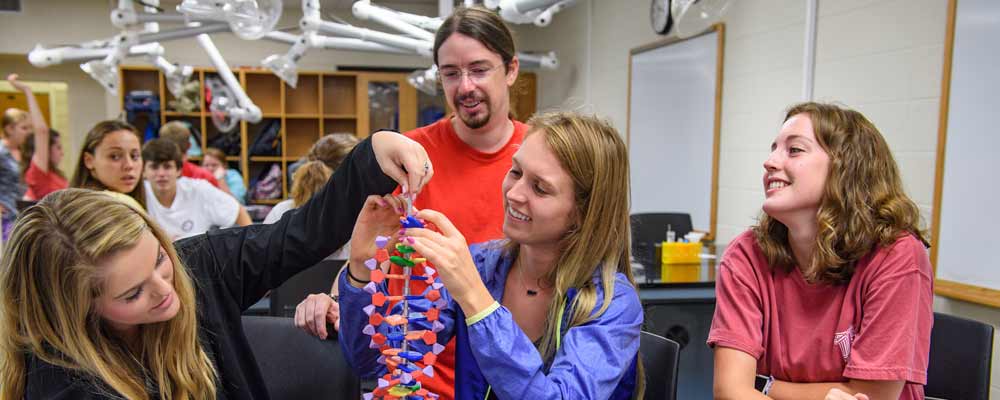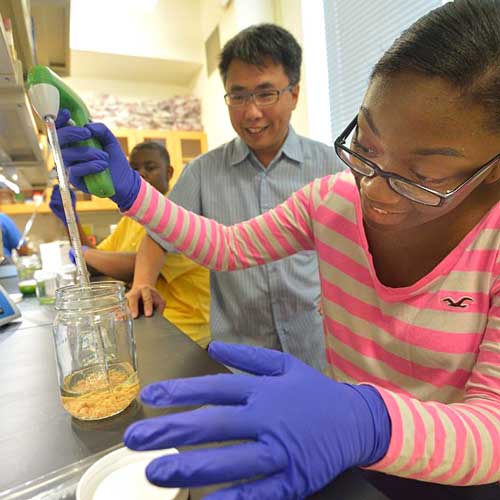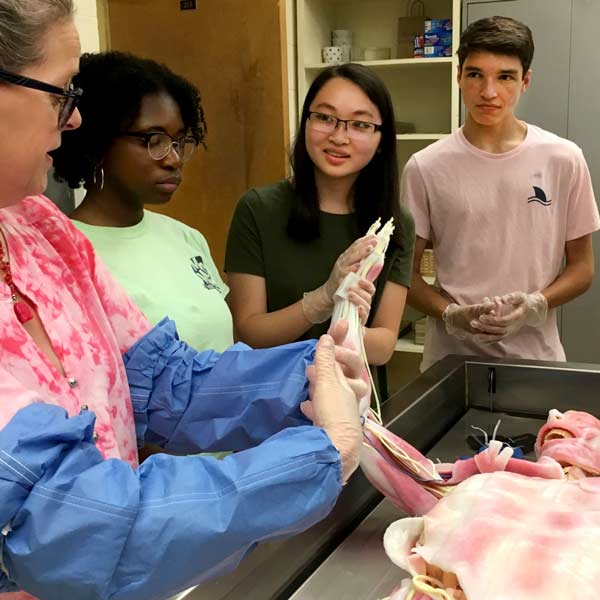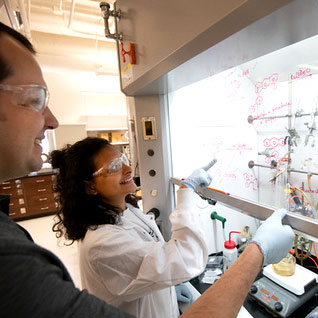Summer STEM Programs for High School Students

Eager to jump in? The programs below give a variety of opportunities, with more or fewer weeks of commitment during the summer to explore different STEM fields.
ARISE
 Created by biologist Dr. Erik Hom, the ARISE@UM program aims to encourage Mississippians to pursue STEM degrees. High school or community college students indicate what STEM discipline they wish to experience, and are assigned into a research lab during the summer – for varying lengths of time as suits the student’s schedule. It’s not a ‘camp’ or a course (although students can earn research course credit if they wish); it’s the opportunity to dive into an ongoing research project with the STEM discipline of their choice!
Created by biologist Dr. Erik Hom, the ARISE@UM program aims to encourage Mississippians to pursue STEM degrees. High school or community college students indicate what STEM discipline they wish to experience, and are assigned into a research lab during the summer – for varying lengths of time as suits the student’s schedule. It’s not a ‘camp’ or a course (although students can earn research course credit if they wish); it’s the opportunity to dive into an ongoing research project with the STEM discipline of their choice!
Beyond the laboratory experience each day, students meet with faculty and experts to learn more about STEM fields and careers, academic success, and scientific writing and communication of results and knowledge. They mix with a wide variety of students and faculty, realize the social context of scientific research, and experience both the thrill of scientific discovery as well as the day-to-day little steps.
Summer College for High School Students
This four-week academic program is for high-achieving high school students who want to experience university life. Students take regular college classes from a wide range of choices, including basic science, engineering, and math. We also offer a track for pre-health professions students wherein they take two related courses and participate in outside-the-classroom activities to learn more about the health professions. Qualified students can earn college credits, get familiar with the collegiate environment, and develop social, personal and academic skills that will increase their overall success in college. Participants in Summer College have the opportunity to gain dual credit (high school and college) for classes taken during the summer. They will stay in campus accommodations with their peers participating in co-curricular activities and field experiences that complement their academic work.
Rebel Research Scholars
 This program, part of the Summer College for High School Students Program, is hands-on and includes faculty-led research experiences in our labs held during the summer for high school students interested in pursuing careers in science, technology, engineering, or mathematics (STEM). Under the guidance and mentorship of experienced research faculty, students will spend about seven hours each day conducting research in a university laboratory setting. Students will be using cutting-edge technologies to explore the sciences. When not in the lab, students will have the opportunity to experience college life on campus with other high school summer program students.
This program, part of the Summer College for High School Students Program, is hands-on and includes faculty-led research experiences in our labs held during the summer for high school students interested in pursuing careers in science, technology, engineering, or mathematics (STEM). Under the guidance and mentorship of experienced research faculty, students will spend about seven hours each day conducting research in a university laboratory setting. Students will be using cutting-edge technologies to explore the sciences. When not in the lab, students will have the opportunity to experience college life on campus with other high school summer program students.
Catalysis Research Program: Artificial Photosynthesis for a Clean Energy Future
 Students will have the opportunity to spend up to 6 hours a day in a state-of the-art research laboratory developing new catalysts for artificial photosynthesis, a process in which sunlight is used to convert water (H2O) and carbon dioxide (CO2) into energy-rich chemical fuels. Catalysts are compounds that mediate reactions so that they proceed more efficiently. This summer research experience involves the development of more effective catalysts for carbon dioxide reduction. Students will work with Dr. Jurss in the Department of Chemistry & Biochemistry and a graduate student mentor to synthesize and characterize new catalysts for energy conversion chemistry and conduct photochemical and/or electrochemical studies to investigate their performance.
Students will have the opportunity to spend up to 6 hours a day in a state-of the-art research laboratory developing new catalysts for artificial photosynthesis, a process in which sunlight is used to convert water (H2O) and carbon dioxide (CO2) into energy-rich chemical fuels. Catalysts are compounds that mediate reactions so that they proceed more efficiently. This summer research experience involves the development of more effective catalysts for carbon dioxide reduction. Students will work with Dr. Jurss in the Department of Chemistry & Biochemistry and a graduate student mentor to synthesize and characterize new catalysts for energy conversion chemistry and conduct photochemical and/or electrochemical studies to investigate their performance.
Nanoparticles and Bioengineering: Tanner Lab Summer Research Experience
Participants in the Tanner Lab Summer Research Experience will get the chance to work in a collaborative research environment that straddles physical chemistry and bioengineering. We are trying to create effective nanomedicines to cure all kinds of diseases — including sepsis, cancers, and chronic lung conditions — but we need the next generation of scientists (you!) to get there. You will learn how to make and test nanoparticles and ionic liquids and work in a team with other scientists, including Dr. Tanner in the Department of Chemistry & Biochemistry. Students that would enjoy this research are those that want to use science to improve human health and are interested in digging in to understand ‘why’ on the smallest scales.
